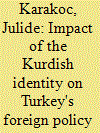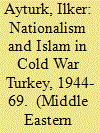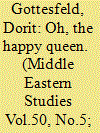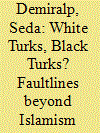| Srl | Item |
| 1 |
ID:
099828


|
|
|
| 2 |
ID:
133526


|
|
|
|
|
| Publication |
2014.
|
| Summary/Abstract |
Our current knowledge on the history of Turkish nationalism during the Cold War is a blend of facts and myths. One of those myths is the argument that the Turks developed a special relationship with Islam following their massive conversion in the eleventh century to the extent that religion has become the most important ingredient in Turkish national identity over time, even more pronounced than ethnic attributes. Secular visions of Turkish nationalism, on the other hand, which emphasize ethnic characteristics, are generally regarded as curious but unimportant exceptions. This article challenges that narrative and maintains that the alleged unimportance of secular nationalism is an invention of the late 1960s. It provides evidence that there was no consensus among Turkish nationalists on the question of Islam; on the contrary, the role of Islam in the making of Turkish identity was the most hotly debated topic among rival nationalist circles. It was not until the turning point in 1969 that a host of factors such as demographic change, anti-Kemalist and anti-RPP sentiments, and electoral behaviour in Cold War Turkey convinced Turkish nationalists to adopt a more Islamic-leaning discourse to be more successful at the ballot box.
|
|
|
|
|
|
|
|
|
|
|
|
|
|
|
|
| 3 |
ID:
133527


|
|
|
|
|
| Publication |
2014.
|
| Summary/Abstract |
This article examines the writing of ?uz?mah ?ab?yib, a new generation Palestinian writer, who is considered one of the foremost Palestinian women writers. It focuses on her novel Qabl an tan?m al-malikah, which serves as an example of the bold and dissident writing of the new generation of Palestinian women writers. The article examines the way in which ?ab?yib creates a feminization of humour and a kind of a 'feminine humour'. ?ab?yib employs humour in order to shed light on the darkness of life and show how despite everything and in spite of an arduous and troubled life, women know how to enjoy the small and everyday things in life.
|
|
|
|
|
|
|
|
|
|
|
|
|
|
|
|
| 4 |
ID:
116890


|
|
|
|
|
| Publication |
2012.
|
| Summary/Abstract |
According to popular views, contemporary Turkish politics is defined by the ideological conflict between Islamist and secularist parties. However, the focus on the Islamism versus secularism dichotomy, a common bias in the studies of Muslim countries, disguises a deeper faultline between the old urban elites and the newly rising provincial actors. This article highlights the need to see beyond the 'Islamism-secularism' divide and to consider the complex relations of power between alienated social groups in Turkey. It analyses the intricate and multi-layered forms of 'othering' in the urban secularist discourse, which perpetuates the inequalities and contention in society. Instead of taking the 'Islamism-secularism' divide as given, the article analyses the construction of secularist and Islamic identities and considers how this dichotomous discourse has empowered the urban parties to control the provincial. Finally, implications for the reconciliation of antagonised social groups are presented.
|
|
|
|
|
|
|
|
|
|
|
|
|
|
|
|